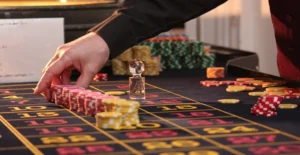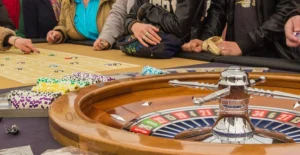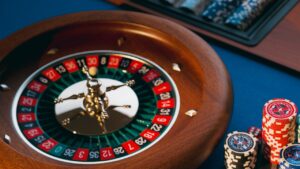So, you want to get good at blackjack tournaments? It’s not just about luck, you know. There’s a real method to it, a way to play smart and outmaneuver the other folks at the table. This guide will walk you through some key ideas, from understanding how these tournaments even work to making those crucial bets. If you’re serious about learning how to win a blackjack tournament, stick around.
Key Takeaways
- Blackjack tournaments are about beating other players, not the dealer; everyone starts with the same chips.
- Always know your chip count and the chip counts of your opponents to make smart betting choices.
- Your betting position matters a lot, especially in the last hand.
- Basic blackjack strategy is important, but you also need to know when to change it up for tournament play.
- Practice makes perfect; review your games to find ways to improve for next time.
What Is a Blackjack Tournament? Format, Rules & Scoring
Blackjack tournaments offer a different kind of thrill compared to standard casino blackjack. Instead of playing against the house, you’re competing against other players. The goal isn’t just to beat the dealer, but to accumulate more chips than your opponents within a set number of hands. Understanding the format, rules, and scoring is the best way to play blackjack tournaments, and a good start.
The primary objective in a blackjack tournament is to finish each round with more chips than your competitors at the table.
Think of it like a poker tournament, but with blackjack. Everyone starts with the same amount of chips, and after a predetermined number of hands, the player with the most chips advances to the next round. This continues until a final table is reached, where the ultimate winner is crowned.
Blackjack tournaments add a layer of strategy beyond basic blackjack. You need to consider not only your hand but also the chip counts and betting patterns of your opponents. This makes for a more dynamic and engaging experience.
Here’s a breakdown of what you can typically expect:
- Entry Fee/Buy-in: You’ll need to pay an entry fee to participate. This fee contributes to the prize pool.
- Starting Stack: All players begin with the same amount of chips.
- Number of Hands: Each round consists of a fixed number of hands, usually between 20 and 30.
- Betting Limits: Tournaments often have minimum and maximum betting limits.
- Advancement: The player (or players) with the most chips at the end of each round advances to the next round.
- Final Table: The final round involves the remaining players competing for the top prizes.
- Prizes: Prizes are awarded to the top finishers, with the winner typically receiving the largest share of the prize pool. Knowing how to succeed in blackjack tournaments is key to winning the prizes.
Normal blackjack rules apply, but there are some exceptions. For example, some tournaments may allow splitting any two ten-value cards (like a King and a Jack). Also, pay attention to the betting rules, as players usually bet one by one in turn.
Master Basic Blackjack Rules and Strategy
To crush it in a blackjack tournament strategy, you can’t just wing it. You need a solid understanding of the game’s core rules and a good grasp of basic strategy. Think of it as building a house – you can’t start with the roof; you need a strong foundation first. This means knowing when to hit, stand, double down, or split, based on your hand and the dealer’s upcard. It’s not about guessing; it’s about making informed decisions based on probability.
- Know the Rules: Understand the specific rules of the tournament you’re in. Does the dealer hit on soft 17? How many decks are in play? These details can significantly impact your strategy.
- Master Basic Strategy: Learn the basic strategy chart. This chart tells you the statistically best move to make in any given situation. You can find these charts online or in blackjack books. Print one out and use it while you practice.
- Practice, Practice, Practice: The more you play, the more natural these decisions will become. Start by playing online or with friends to get comfortable with the basic strategy before entering a tournament.
Blackjack isn’t just about luck; it’s about making smart choices. The more you understand the game, the better your chances of winning. Don’t be afraid to study and practice. It’s an investment that will pay off in the long run.
Knowing the rules and basic strategy is just the beginning, but it’s a crucial step towards mastering tips for winning blackjack competitions. You’ll need to adapt your strategy based on the tournament format, your opponents, and the current chip counts. But without a solid foundation in the basics, you’ll be playing at a disadvantage.
Understand Betting Position and Table Order Advantage
In blackjack tournaments, where you sit and when you bet can change how you play. It’s not just about the cards you’re dealt; it’s about how you use your position to make smart bets and outsmart your opponents. Knowing how to use these advantages can be a game-changer.
The Power of Position
Your position at the table affects the information you have when making decisions. Betting last is often better because you see what others do first. This lets you adjust your bet based on their actions. Being the last to bet gives you the most information, which is a big advantage.
Betting Order Matters
The order in which players bet can significantly impact strategy, especially in the final hands of a round. If you’re betting first, you’re at a disadvantage because you don’t know what your opponents will do. If you’re betting last, you can tailor your bet based on what everyone else has done. This is why many players try to get into a favorable position before the last hand.
Adjusting to the Button
In blackjack tournaments, a dealer button is often used to make sure everyone has a fair shot at different positions. The button rotates, so everyone gets a turn betting last. Keep track of where the button is, and plan your bets accordingly. If you know you’ll be betting first on the last hand, you might want to bet more aggressively in earlier hands to try and get the lead.
Understanding betting positions and table order is not just about knowing who bets when; it’s about using that knowledge to make better decisions. It’s about anticipating your opponents’ moves and positioning yourself for success, especially in those crucial final hands.
Strategic Seat Selection
Experienced blackjack players often choose their seats carefully. The last seat, playing heads-up with the dealer, is unique because it’s not affected by other players’ actions, making it a strategic choice for some. If you have a choice, think about how your playing style matches up with different positions at the table.
Adapting to Different Scenarios
- Early Position: If you’re betting early, you might want to bet conservatively to avoid giving away too much information.
- Middle Position: In the middle, you can get a sense of what the early bettors are doing before making your move.
- Late Position: Betting last lets you react to everyone else, giving you the most control over the hand.
Using Information to Your Advantage
Pay close attention to how other players bet. Are they aggressive or cautious? Do they change their bets based on their position? Use this information to predict their moves and make smarter bets yourself. For example, if a player always bets big when they’re in the last position, you can adjust your strategy accordingly.
The Final Hand Strategy
The last hand of each round is where position matters most. If you’re betting first and don’t have the lead, it’s tough because you’re betting blind. In this case, a common strategy is to bet the maximum amount. If you’re betting last, you have a huge advantage because you can see what everyone else has bet and make a calculated move to win the round. Remember, on the final hand, players can ask the dealer for exact chip counts, allowing for better strategy adjustments.
Betting Limits and Position
Always pay attention to the maximum betting limits. You should try to never be more than one maximum betting distance away from the player with the most chips in the last rounds of the game. Otherwise, you won’t be able to bet enough to catch up. You should also always have enough chips to double down or split pairs if needed.
Effective Bankroll & Chip Management in Tournaments
Blackjack tournaments aren’t just about playing the cards right; it’s also about managing your chips effectively. Think of your chips as ammunition – you need to use them wisely to survive and thrive. It’s not enough to know basic strategy; you need a plan for how you’ll bet and when.
Understanding Chip Denominations and Their Impact
Knowing the value of each chip and how they relate to the minimum and maximum bets is important. It affects your betting flexibility. For example, if the minimum bet is 5 and you only have 1 chip, you’re severely limited. Understanding chip denominations allows for more precise betting strategies.
Setting Limits and Sticking to Them
Before the tournament even starts, decide on a limit for how much you’re willing to risk overall. This isn’t just about the entry fee; it’s about how much you’re prepared to lose in rebuys (if allowed) or side bets. Once you hit that limit, walk away. It’s also a good idea to set a target for how much you want to win. This helps you avoid getting greedy and making reckless bets when you’re ahead. To extend blackjack playing sessions, implement simple bankroll strategies by setting limits on both winnings and losses.
The Importance of Tracking Your Chip Stack
Always know how many chips you have relative to your opponents. This is critical for making informed betting decisions, especially in later rounds. If you’re trailing, you might need to take bigger risks to catch up. If you’re leading, you might want to play more conservatively to protect your position. Keep a close eye on the other players’ stacks, too. Try to guess what they might be betting when it is their turn.
Effective chip management is not just about avoiding losses; it’s about maximizing your opportunities to win. It’s about understanding the flow of the tournament and adjusting your strategy accordingly. It’s about being disciplined and making smart decisions, even when the pressure is on.
Strategic Chip Accumulation
Early in the tournament, focus on building a solid chip stack without taking unnecessary risks. This gives you more flexibility later on. Avoid making huge bets early on unless you have a very strong reason to do so. Instead, try to grind out small wins and gradually increase your stack. As the tournament progresses, you’ll need to become more aggressive, especially if you’re behind. This might involve making larger bets or taking calculated risks to try to catch up.
Here’s a simple table illustrating how chip accumulation might look across rounds:
| Round | Starting Chips | Target Chips | Strategy |
| 1 | 1000 | 1200 | Conservative |
| 2 | 1200 | 1500 | Slightly Aggressive |
| 3 | 1500 | 2000+ | Aggressive (if needed) |
Re-buys: When to Take the Plunge
If the tournament allows rebuys, think carefully before taking the plunge. Re-buying can be a good way to get back in the game if you’ve had a bad run, but it can also be a waste of money if you’re not playing well. Consider your chip stack, the remaining time in the re-buy period, and your overall strategy before making a decision. Sometimes, it’s better to cut your losses and wait for the next tournament.
Adapting Bet Sizing
Blackjack tournaments aren’t just about playing the cards right; it’s also about playing your bets right. You need to be flexible and change your bet size based on a bunch of factors. This includes your chip stack, your opponents’ stacks, and where you are in the tournament. It’s a balancing act, but getting it right can make all the difference.
Chip Stack Awareness
Knowing how many chips you have compared to the others is super important. If you’re way behind, you might need to make bigger, riskier bets to catch up. If you’re in the lead, you might want to play it safer and make smaller bets to protect your position. Your bet size should always reflect your relative standing in the tournament.
Reading the Table
Pay attention to what your opponents are doing. Are they betting big or small? Are they conservative or aggressive? Their betting patterns can give you clues about their hands and their overall strategy. Use this information to adjust your bets accordingly. For example, if someone is betting big, you might want to bet big too, to keep pace or even overtake them. If you are playing blackjack strategies, you need to be aware of the table.
Stage of the Tournament
How you bet early on should be different from how you bet later. In the early rounds, you might want to play it a bit safer and build up your stack gradually. But as you get closer to the final table, you might need to take more risks to secure a spot. The later stages often require bigger, more strategic bets to either catch up or maintain a lead.
Think of it like this: early on, you’re just trying to survive. Later on, you’re trying to win. Your bets should reflect that shift in mindset.
The Final Hand
The last hand is where it all comes down to. You need to know exactly how much you need to bet to win, and you need to be prepared to bet it all, even if it means doubling down on a bad hand. Sometimes, you have to go all in to have any chance of winning. It’s a high-pressure situation, but it’s also where you can make or break your tournament.
Here’s a simple breakdown:
- Trailing by a lot: Bet big to catch up.
- Slightly behind: Bet enough to overtake if you win.
- In the lead: Bet enough to stay ahead, but not so much that you risk losing your lead.
- Final hand: Calculate the exact amount needed to win and bet it all.
Betting Patterns
Understanding betting patterns in blackjack tournaments is super important. It’s not just about knowing basic blackjack rules; it’s about figuring out what your opponents are likely to do and using that to your advantage. It’s like a poker face, but with chips.
Recognizing Common Betting Tells
Okay, so people aren’t always great at hiding their intentions. Some players bet big when they’re nervous, others bet small when they’re confident. The key is to watch how they bet in different situations and see if you can spot a pattern. For example, does a player always max bet after losing a hand? Or do they tend to bet the minimum when they’re unsure? Keep notes if you can; it’ll help you remember.
Exploiting Opponent Tendencies
Once you’ve identified some tendencies, you can start using them against your opponents. If you know someone always bets big when they’re bluffing, you can call their bet with a weaker hand. Or, if they always bet small when they have a strong hand, you can raise them to force them to fold. It’s all about using their predictability to your advantage.
Varying Your Bets to Stay Unpredictable
Of course, you don’t want to be predictable yourself. If you always bet the same way in the same situations, your opponents will quickly figure you out. So, mix things up. Sometimes bet big when you have a weak hand, and sometimes bet small when you have a strong hand. The goal is to keep your opponents guessing so they can’t read you.
It’s important to remember that betting patterns can change throughout the tournament. Players might start out playing conservatively and then become more aggressive as the stakes get higher. So, keep an eye on how your opponents are adjusting their bets and adjust your strategy accordingly.
Adjusting to Table Dynamics
The way you bet should also depend on the other players at your table. If you’re at a table with a lot of aggressive players, you might want to play more conservatively and wait for good opportunities to bet big. If you’re at a table with a lot of passive players, you can be more aggressive and try to steal pots. It’s all about adapting to the specific dynamics of your table.
The Art of Opposite Betting
One strategy some players use is opposite betting. The idea is simple: if a player bets big, you bet small, and vice versa. This can be a good way to catch up if you’re behind, but it’s risky. If you’re more than a max bet behind, and the tournament is halfway over, you might need to make bigger bets to catch up. It’s a gamble, but sometimes you have to take risks to win.
Reading Opponents
Okay, so you’ve got your basic strategy down, you understand bankroll management, and you’re ready to crush this blackjack tournament. But there’s one more thing that can give you an edge: paying attention to your opponents. It’s not about being a mind reader, but more about gathering information that can inform your decisions. Are they aggressive bettors? Are they conservative? Do they seem to understand basic strategy, or are they just winging it? All of this matters.
Observing Betting Patterns
One of the first things you should do is watch how your opponents bet. Are they consistently betting the minimum, or are they making big swings? Do they seem to increase their bets when they’re winning, or when they’re behind? This can give you clues about their risk tolerance and their overall strategy. For example, someone who consistently bets the minimum might be more risk-averse and less likely to make aggressive plays later in the tournament. On the other hand, someone who’s constantly betting big might be trying to build a stack quickly, but they’re also more likely to bust out early. Understanding these betting patterns can help you anticipate their moves and adjust your strategy accordingly.
Deciphering Body Language
While you can’t rely solely on body language, it can sometimes provide additional clues about your opponents’ hands or their confidence level. Are they fidgeting nervously when they have a bad hand? Do they seem relaxed and confident when they have a good one? Are they making eye contact with the dealer or avoiding it? These are all things to pay attention to. Now, people are different, and some are just naturally fidgety, but over time, you might start to notice patterns that can give you an edge. Just don’t get too caught up in trying to be a poker detective; focus on the more concrete aspects of their play first.
Exploiting Perceived Weakness
Sometimes, you’ll encounter opponents who seem unsure of themselves or who are making mistakes. This is where you can capitalize. If someone is consistently hitting on stiff hands or making other obvious errors, you can adjust your strategy to take advantage of their weaknesses. For example, if you know that someone is likely to bust, you might be more willing to stand on a lower total, knowing that they’re likely to eliminate themselves. It’s all about identifying those opportunities and making the most of them. Just remember to stay focused on your own game and not get too distracted by your opponents’ mistakes. You still need to play smart and make good decisions, even when your opponents are making bad ones.
It’s important to remember that reading opponents is not an exact science. People can be unpredictable, and sometimes they’ll do things that don’t make sense. The key is to gather as much information as possible and use it to inform your decisions, but always trust your instincts and stick to your overall strategy.
Adjusting Strategy Based on Opponent Tendencies
Ultimately, the goal of reading opponents is to adjust your strategy to maximize your chances of winning. If you’re up against a table full of conservative players, you might need to be more aggressive to build a stack. If you’re up against a table full of aggressive players, you might need to be more patient and wait for them to make mistakes. It’s all about adapting to the specific dynamics of your table and making the right adjustments at the right time. This is where experience comes into play, so don’t be afraid to experiment and see what works best for you. And remember, even the best players can be wrong sometimes, so don’t get discouraged if your reads don’t always pan out. Just keep learning and keep improving, and you’ll be well on your way to becoming a blackjack tournament champion.
Tournament-Specific Transition
Blackjack tournaments aren’t just about playing good blackjack; it’s about adapting your strategy as the tournament progresses. What works in the early rounds might be disastrous in the later stages. You have to be ready to shift gears, change your betting patterns, and focus on specific opponents. It’s a dynamic environment, and those who can adjust on the fly are the ones who usually end up at the final table. Understanding blackjack tournament rules is key to making these transitions smoothly.
One of the biggest mistakes players make is sticking to a rigid strategy throughout the entire tournament. The chip counts of your opponents, the number of hands left, and your position at the table all play a huge role in determining the optimal play. You need to constantly reassess the situation and be willing to deviate from basic strategy when necessary.
Think of it like this: early on, you’re trying to build a solid stack and avoid elimination. But as you get closer to the end, it becomes more about outmaneuvering your closest competitors and securing a spot in the next round. This often means taking calculated risks and making unconventional plays.
Here are some things to keep in mind as you transition through the tournament:
- Monitor Chip Counts: Always know where you stand relative to your opponents. This is crucial for making informed betting decisions.
- Adjust Betting Strategy: Be prepared to vary your bet sizes based on your chip position and the stage of the tournament.
- Identify Key Opponents: Focus on the players who pose the biggest threat to your advancement. These are the ones you need to outsmart.
The Final Hand
The final hand in a blackjack tournament is where everything comes down to the wire. It’s the culmination of all your strategic planning, bankroll management, and opponent reading. This is where fortunes are made or lost, and understanding how to approach it is vital for success. The pressure is on, the stakes are high, and every decision counts.
The final hand is often the most crucial moment in determining the tournament winner.
Approaching the final hand requires a cool head and a calculated strategy. Don’t let the pressure get to you; stick to your plan and make informed decisions based on the information available.
Here are some things to keep in mind:
- Chip Counts: Before the final hand, make sure you know the exact chip counts of all players at your table. This information is essential for formulating your betting strategy.
- Betting Position: Your position relative to the other players is critical. If you bet first, you’re at a disadvantage because you don’t know how much your opponents will wager. If you bet last, you have the advantage of seeing everyone else’s bets before making your own.
- Maximum Bet: Be aware of the maximum betting limit. This will influence how aggressively you can bet to catch up or maintain a lead. You should try to never be more than one maximum betting distance away from the player ahead of you.
Use Basic Strategy Deviations for Tournament Contexts
Blackjack tournaments aren’t just about playing perfect blackjack; it’s about outsmarting your opponents. That means sometimes you’ve got to throw basic strategy out the window. It’s all about adapting to the specific situation in the tournament.
Knowing when to deviate from basic strategy is key to maximizing your chances of winning.
Think of it like this: basic strategy is your foundation, but tournament strategy is the advanced course. You need to know the rules before you can break them effectively. Consider your chip stack relative to your opponents, the betting structure, and your position at the table. These factors will influence your decisions far more than the cards in your hand sometimes.
- If you’re way behind, you might need to take bigger risks to catch up.
- If you’re way ahead, you might play more conservatively to protect your lead.
- If you’re in a late betting position, you have more information and can make more informed decisions.
Deviating from basic strategy can feel risky, but it’s often necessary to gain an edge in a tournament. Don’t be afraid to make unconventional plays if they align with your overall tournament strategy. Just make sure you understand the potential consequences before you act.
Knowing when to correlate bets with your opponents, when to raise, or when to bet the minimum are all important skills. It’s a complex game of reading the table and making calculated risks. Remember, it’s not just about playing the cards; it’s about playing the players.
Avoid Insurance and Side Bets Unless Strategically Justified

Insurance bets and side bets can be tempting, but they often carry a high house edge. In blackjack tournaments, where every chip counts, making mathematically sound decisions is important. Let’s be real, most of the time, these bets are just a way for the casino to pad their profits. However, there are rare situations where taking insurance or placing a side bet might make sense from a tournament strategy perspective.
Think of insurance as a safety net that usually has holes. It might seem appealing when the dealer shows an Ace, but over time, it’s more likely to cost you money. Only consider it if it directly contributes to a larger tournament strategy, like manipulating chip counts or influencing opponent behavior.
Here’s the lowdown:
- Insurance is generally a bad bet. It’s a side bet that the dealer has blackjack, and the odds are usually not in your favor.
- Side bets have high house edges. Things like “Perfect Pairs” or “21+3” might seem fun, but they’re sucker bets in the long run.
- Strategic exceptions exist. If you’re in a situation where taking insurance or a side bet can manipulate the chip counts in a way that benefits you, then it might be worth considering. For example, if you need to formulate your betting strategy to get close to another player’s stack size.
Unless you have a very specific reason to take insurance or place a side bet, it’s best to avoid them. Stick to a basic strategy and focus on making smart decisions with your main bets. Remember, the goal is to outmaneuver your opponents, not to get lucky with a long-shot side bet.
Maintain Composure Under Pressure
Blackjack tournaments can be intense. The pressure of making the right decisions with significant amounts of chips on the line can affect your judgment. It’s important to develop strategies to remain calm and focused, even when things aren’t going your way. A clear head is your best asset in these situations.
Recognize Tilt and Its Triggers
Tilt, in gambling terms, refers to a state of mental or emotional confusion or frustration in which a player adopts a less-than-optimal strategy, usually resulting in the player becoming over-aggressive. Identifying what causes you to tilt is the first step in managing it. Common triggers include:
- Losing a big hand.
- Making a mistake.
- Dealing with aggressive opponents.
Once you know your triggers, you can take steps to avoid or mitigate them. For example, if losing a big hand throws you off, remind yourself that variance is part of the game and that one hand doesn’t define your entire tournament. It’s important to remember that you’re playing against other players, not against the dealer, so you need to know your opponent’s counts.
Develop Mental Resilience
Mental resilience is your ability to bounce back from setbacks. Here are some techniques to build it:
- Practice mindfulness: Take a few deep breaths before each hand to center yourself.
- Focus on the process, not the outcome: Concentrate on making the best decisions based on the information available, rather than worrying about whether you’ll win or lose.
- Take breaks: If you feel overwhelmed, step away from the table for a few minutes to clear your head. This can help you avoid making rash decisions when you bet big.
Remember, everyone makes mistakes. The key is to learn from them and not let them derail your entire tournament. Acknowledge the error, adjust your strategy if necessary, and move on.
Manage Your Emotions
Emotions can cloud your judgment and lead to poor decisions. Here’s how to keep them in check:
- Stay objective: Evaluate each situation rationally, without letting emotions influence your choices.
- Avoid impulsive bets: Don’t make bets based on hunches or feelings. Stick to your strategy and make calculated decisions.
- Control your reactions: Don’t let your opponents see that you’re flustered. Maintain a calm and collected demeanor, even when you’re under pressure. It’s important to play casino table games with a clear head.
Stay Focused on the Game
Distractions can easily throw you off your game. Here’s how to stay focused:
- Minimize distractions: Avoid unnecessary conversations or other activities that can take your attention away from the game.
- Pay attention to the table: Observe your opponents’ betting patterns and body language to gather information that can help you make better decisions.
- Stay present: Focus on the current hand and avoid dwelling on past mistakes or worrying about future outcomes.
Post‑Tournament Review: Learn from Performance for Future Wins

Tournaments are intense, and once they’re over, it’s tempting to just relax. But taking the time to review your performance is super important if you want to improve. It’s like watching game film in sports – you see what worked, what didn’t, and where you can get better. Don’t just focus on whether you won or lost; dig into the details of your decisions.
Analyze Betting Decisions
Go back through each round and look at your betting choices. Why did you bet that amount? What were you hoping to achieve? Were there alternative bets that might have been better? Consider these questions:
- Did you adjust your bets based on your position at the table?
- Did you effectively manage your chip stack relative to the other players?
- Were there times when you should have been more aggressive or more conservative?
Evaluate Strategic Plays
Blackjack tournaments require more than just basic strategy; they demand smart, adaptable play. Review your key hands and ask yourself:
- Did you deviate from basic strategy appropriately, given the tournament context?
- Did you make the right calls on doubling down or splitting pairs?
- Were there opportunities to exploit your opponents’ weaknesses?
Assess Opponent Reads
Reading your opponents is a big part of tournament blackjack. Think about how well you did at figuring out their strategies and tendencies. Did you accurately predict their bets? Did you adjust your play based on their actions? If you struggled with this, it’s something to work on for next time. Improving your poker strategy can significantly impact your tournament performance.
Identify Strengths and Weaknesses
Be honest with yourself about what you did well and where you struggled. Maybe you’re great at bankroll management, but need to improve your opponent reading skills. Or perhaps you’re good at making aggressive bets but need to be more disciplined in early rounds. Knowing your strengths and weaknesses is the first step toward becoming a better player.
Develop an Action Plan
Based on your review, create a plan for improving your game. This might involve studying advanced blackjack strategies, practicing your opponent reading skills, or working on your bankroll management techniques. Set specific, measurable, achievable, relevant, and time-bound (SMART) goals to track your progress.
Reviewing your tournament performance isn’t just about finding mistakes; it’s about learning and growing as a player. It’s a chance to refine your strategies, improve your decision-making, and ultimately increase your chances of winning in future tournaments. Treat each tournament as a learning experience, and you’ll be well on your way to success.
Track Your Results
Keep a record of your tournament results, including your finishing position, chip count, and key decisions. This will help you track your progress over time and identify patterns in your play. You can use a spreadsheet or a notebook to record this information. Over time, you’ll be able to see how your skills are improving and where you still need to focus your efforts.
Frequently Asked Questions
What is a blackjack tournament?
In a blackjack tournament, participants compete against one another, not against the casino. The objective is to finish each round with more chips than your opponents. All players begin with the same amount of chips, and after a set number of hands, the player with the highest chip count advances to the next stage.
How does tournament strategy differ from regular blackjack?
While fundamental blackjack strategy is crucial, tournament play requires additional considerations. You must constantly monitor your opponents’ chip counts and adjust your betting strategy accordingly. This includes knowing when to bet large, when to bet small, and when to match your opponents’ bets.
Why is betting position important in a blackjack tournament?
Your betting position at the table is very important, especially in the final hands of a round. Being the last to bet can offer a significant advantage, as you can react to your opponents’ actions. If you are in an early betting position for a critical hand, you may need to play more aggressively in earlier hands to build a lead.
What is chip management in a tournament?
Effective chip management means constantly knowing your chip total relative to your opponents. This allows you to make informed decisions about how much to bet. The goal is to always have more chips than your rivals at the end of a round.
Are there different types of blackjack tournaments?
Yes, there are different formats. Elimination tournaments are very common. In these, players are eliminated until only a few remain for the final table, where the champion is decided.
What key skills are needed to win a blackjack tournament?
To succeed, you need to be aware of your opponents’ chip counts, understand when to make big bets (to get ahead if everyone wins), and when to make small bets (to stay ahead if everyone loses). You also need to know when to bet the same amount as your opponents and how to adjust your bets based on potential outcomes.
Should I always follow basic blackjack strategy in a tournament?
While basic strategy is your foundation, you should be prepared to adjust it based on the tournament situation. For example, you might need to make a riskier play to catch up to an opponent, or a safer play to protect a lead. The main difference is that you are playing against other people, not just the dealer.
How can I improve my tournament play after a round?
After each round, take time to think about what you could have done better. This reflection helps you learn from your experience and improve your play in future rounds. Even small adjustments can lead to better results over time.
Daniel Chase is a seasoned casino analyst and iGaming writer with over 10 years of experience in the online gambling industry. He specializes in game strategy, casino odds, and player-focused reviews. Daniel is passionate about helping players make smarter decisions through transparency, real data, and honest insight.













